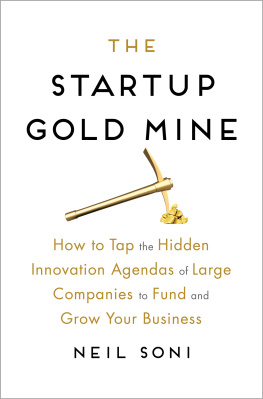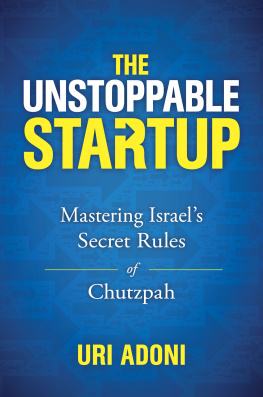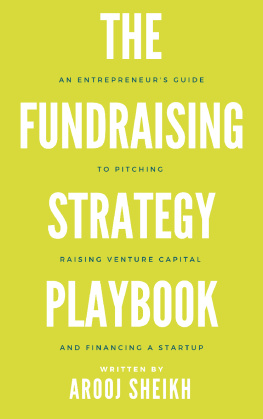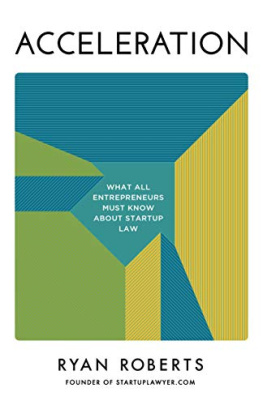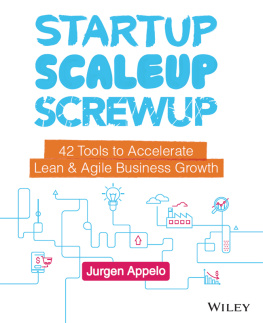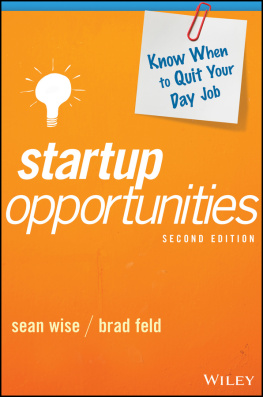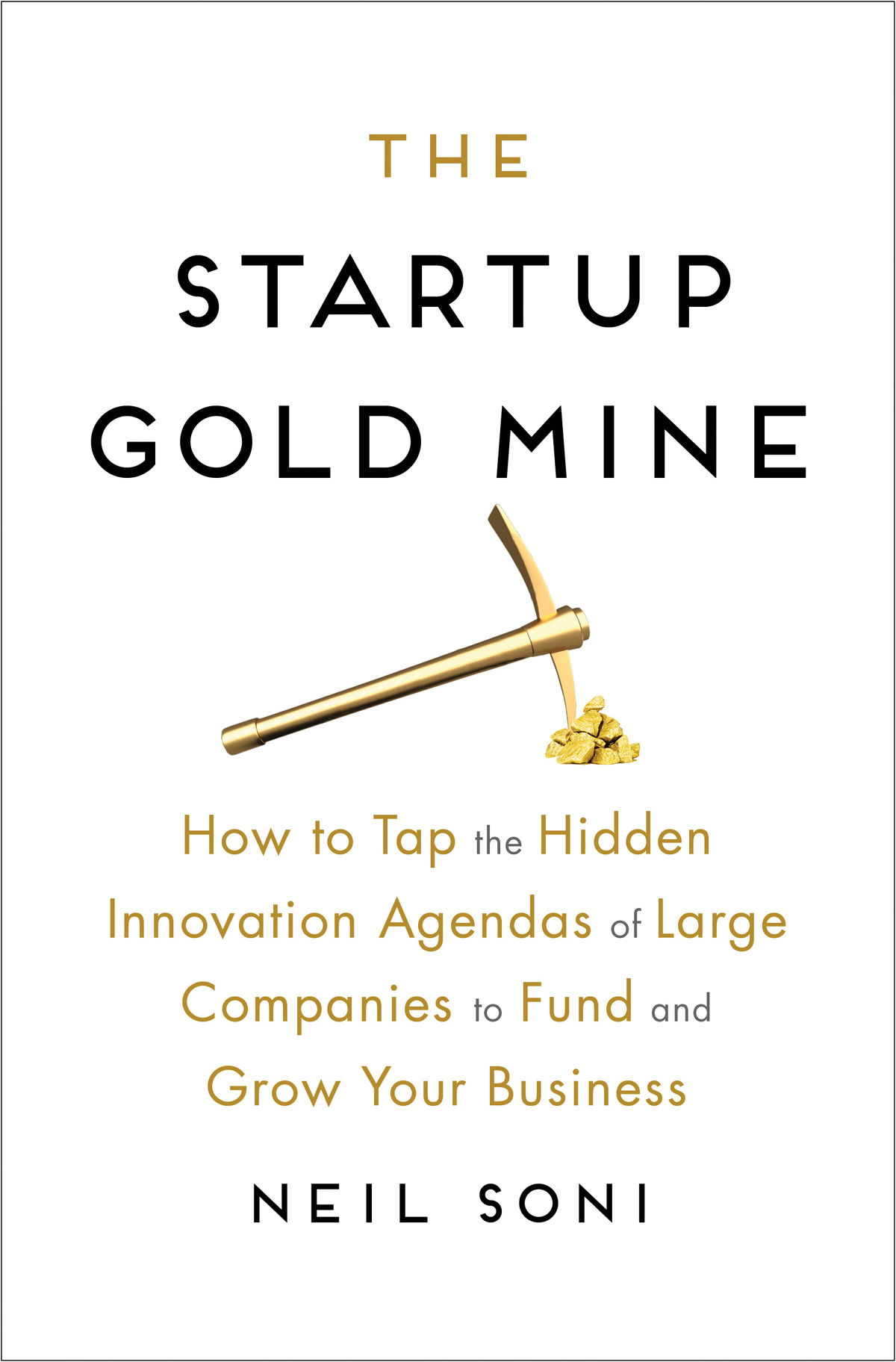CONTENTS
Guide
Information about External Hyperlinks in this ebook
Please note that endnotes in this ebook may contain hyperlinks to external websites as part of bibliographic citations. These hyperlinks have not been activated by the publisher, who cannot verify the accuracy of these links beyond the date of publication.
PRAISE FOR
STARTUP GOLD MINE
A really useful guide for startup founders and big company executives alike. Packed with practical steps and common mistakes, this book is one to read attentively and keep handy for future referencing.
MARIA THOMAS,
former Etsy CEO, SmartThings CMO
The Startup Gold Mine is THE playbook for getting your startup-corporate deals across the finish line. Every founder needs to read this!
JUSTIN MARES,
founder of Kettle & Fire, coauthor of Traction
Over the last decade, big companies have completely changed their approach to innovation, with startups at the center of those efforts. The Fortune 500 are turning to startups for innovation across every facet of their business, ranging from marketing and sales to customer service and logistics. Gone are the days when no one ever got fired for buying IBM.
DAVE KNOX,
author of Predicting the Turn,
cofounder of The Brandery, CMO of Rockfish
A productive relationship with the right corporate partner can unlock years of growth for a startup. On the other hand, there are numerous pitfalls along the way that can have you running in circles. The principles in The Startup Gold Mine give founders the proper framework to navigate the startup-corporate intersection to get their deal done.
SEAN AMMIRATI,
partner at Birchmere Ventures,
author of The Science of Growth
Giftology will get you in the door. The Startup Gold Mine will help you close the deal. This is a must-read book for anyone selling into large organizations!
JOHN RUHLIN,
author of Giftology, founder
and CEO of the Ruhlin Group
Ive been working with startups in rapidly growing and evolving industries for over a decade. The principles Neil outlines in The Startup Gold Mine are spot on and essential reading for any founder looking to grow his or her business.
CHRIS CHANEY,
founder, president, and owner,
Infinite Esports & Entertainment
The Startup Gold Mine is enlightening, interesting, and pragmatic. I copied whole sections to relay to my team, and repeatedly had to pause to write notes to action for our own clients. Nearly every founder in the B2B software space has the tough decision of whether to sell to enterprise or smaller companies. The Startup Gold Mine is an indispensable manual for those in the decision phase and for those with a handful of deals.
ISHVEEN ANAND,
founder of OpenSponsorship, Forbes 30 under 30
Factual, informative, and full of useful sound bites startups need to know about when it comes to working with corporates.
RUPA GANATRA,
founding partner of FUTR Group and FUTR Ventures
We built a multimillion-dollar business with Fortune 500 customers by applying the thinking Soni has shared. Your product, pitch, and performance do not have to be perfect. But you must understand these principles to succeed with big enterprise.
SEBASTIAN METTI,
cofounder of Resolute Innovation

2018 Neil Soni
The Startup Gold Mine
All rights reserved. No portion of this book may be reproduced, stored in a retrieval system, or transmitted in any form or by any meanselectronic, mechanical, photocopy, recording, scanning, or otherexcept for brief quotations in critical reviews or articles, without the prior written permission of the publisher.
Published by HarperCollins Leadership, an imprint of HarperCollins.
Book design by Elyse Strongin, Neuwirth & Associates.
Epub Edition September 2018 9780814439883
978-0-8144-3988-3 (eBook)
Library of Congress Control Number: 2018954576
978-0-8144-3987-6
Printed in the United States of America
18 19 20 21 22 LSC 10 9 8 7 6 5 4 3 2 1
Being a founder of a startup is exciting. You have a lot of impact and control over things, including the team you build, the product you create, and the processes for your new business. However, there are many aspects of a startup that can be mystifying, especially to first-time founders. I covered one of these areas, financing your company, in my book Venture Deals: Be Smarter Than Your Lawyer and Venture Capitalist.
Recently, as large, established companies have recognized the importance of innovation, the relationship between startups and large companies has become more prevalent. While large companies are often acquiring startups to build innovative vectors in their business, these large companies are also investing in and partnering with startups to develop new areas of growth. Through this activity, large companies are increasingly looking to startups to fill gaps in their innovation pipelines. From the perspective of a large company, this makes complete sense: predicting which new technologies will catch on is a game better played by entrepreneurs and venture capitalists. Instead of trying to make bets on technology developed in-house, large companies are waiting to see what is gaining traction before making a play.
The fact that large companies are increasingly looking to work with startups is a blessing and a curse. On one hand, large companies have many things startups wantcredibility, distribution, customers, resources, and cash. These elements are some of the missing pieces in the startup puzzle.
But there is a curse lurking among these incredible potential benefits. When trying to work with large companies, startups face many challenges. Navigating the relationshipand these challengesin a productive manner requires threading a needle that is often unknown and hard to discover for many founders.
Large companies operate at an extremely slow pace when compared to startups. What a startup accomplishes in a week can take a large company months to engage with. Startups can make decisions by getting everyone in a room; large companies often have torturous and endless approval processes. Decision-making in a startup is usually streamlined and well understood. Navigating a large company can involve numerous people, including many whom a startup will never physically engage with. By chasing relationships with large companies, you run the risk of slowing down.
Assuming you successfully close a deal with a large company, you then run the risk of becoming a product-development shop for that company. It is natural for a founder to pay attention to what is bringing in revenue and what could potentially lead to an acquisition. But, if too much attention is given to the large company, a founder risks abandoning her larger vision in favor of what she is being asked to create by her corporate partner. And, while the project you are doing may be life and death for your company, the success of the project is likely irrelevant in the short term to your corporate partner.
When Venture Deals was first published, the primary value we were trying to deliver to startup founders was a complete and open approach to helping founders understand how to interact and work with venture capitalists. The book youre holding in your hands fulfills the same goal for startup founders looking to work with large companies. Youll learn many things, including how corporate employees are compensated, what you need to do to initiate and close an enterprise deal, and how to avoid the many pitfalls that await you along the way.

